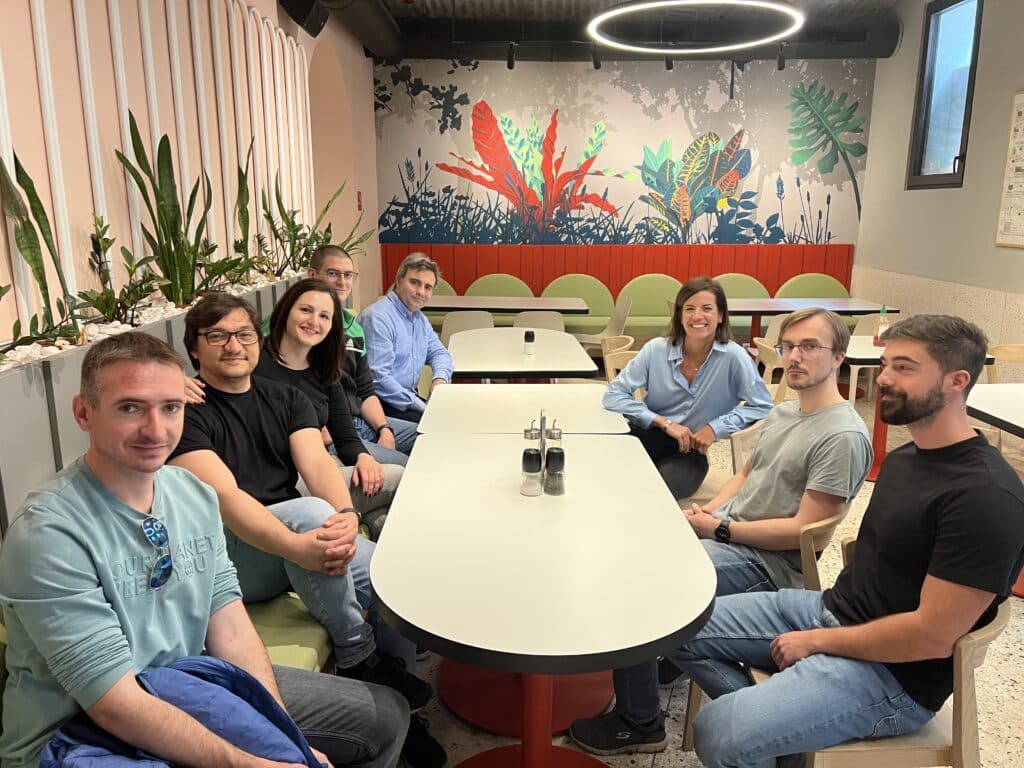The Belgrade team helping to make AI drug history
May 16, 2023
A dedicated group of Unlimiters changes its office, but not its purpose.

From its labs in the Pacific Northwest to its Innovation Center in the technology hub of Zug, Switzerland, and its AI Innovation Lab in New York City, Absci has become a truly global company.
But before New York, before Switzerland, and even before Absci’s beautiful Vancouver headquarters — there was Belgrade.
Absci’s Belgrade office has its roots in Totient, a computational antibody and target discovery platform company that Absci acquired in June 2021. Totient first set up shop in Belgrade in 2017 in pursuit of its goal to harness human immune responses to identify novel antibodies and their therapeutic targets. That work — along with several scientists in AI, data science, and oncology — helped to establish Absci’s reverse immunology platform and the Serbia team today.
Now, the team is moving to Nova Iskra Workspace Dorćol, a new workspace in the old part of Belgrade. The new office is the first coworking space in Belgrade with an accompanying restaurant and bar, along with many other perks: 24/7 access, reception and security, a rooftop terrace, a gaming zone, and it’s dog friendly – which makes the Absci Dog Pack very happy.
Even for a digitally-oriented team that can remotely collaborate on much of its work, the physical office has always been an important touchstone for the Belgrade team. The move to Dorćol will increase that connection.
“Our meetups are important and valuable for building our culture,” says Tijana Zivaljevic, one of Absci’s Belgrade team members. “Some of us have been working together even before Totient was established, and we are excited about new opportunities for collaboration and growth in our new workspace. It’s a big moment for us.”
A rising tech star in the Balkans
Serbia ranks 34 out of 44 countries in Europe in terms of economic freedom — its overall score is above the world average but below the regional average. In the last decade, it has experienced tremendous growth, with Belgrade emerging as a thriving technology hub.
The city is home to a growing number of innovative tech firms, incubators, accelerators, and co-working spaces. (EV maker Rivian just opened a tech center there, where it plans to employ 1,200.) The city’s rich cultural heritage and affordable cost of living make it an attractive destination for tech talent seeking a high quality of life.
“Serbia is a relatively small country,” says Tijana, “and for well-qualified, highly-educated workers in biotech, the job market is small.” She believes that as more companies like Absci create high-quality jobs and contribute to the growth of Serbia’s tech sector, the opportunities for the country’s scrappy, educated workers will only grow.
“We love this country and we are happy to contribute as much as we can,” she continues. “Our families are here, and if someone has a chance to get an education, they have much more opportunities than our grandparents’ generation, who needed to work from a young age to help support their families.”
Speaking about the Absci team, she says: “We are lucky to have the opportunity to work here since the beginning and that has made us a very good team.”


Technology with purpose
With its strong AI and data science expertise, the Belgrade team is contributing directly to helping make Absci the ChatGPT of antibody drug discovery. But instead of generating text in response to a prompt, Absci generates biologic drug candidates in response to a disease target, for example. In doing so, they’re helping to change the paradigm from drug discovery to drug creation.
Tijana, for one, feels strongly tied to Absci’s mission to create better biologics, faster.
“It’s important for me to know that the work I do in economics or administration can provide support in improving people’s health in the world,” she says. “Here, I see a bigger purpose.”
She compares it to the heart surgery her mother received two years ago. Instead of an invasive bypass procedure — the standard of care just five or six years earlier — her mother benefited from medical innovations that enabled her to have a far less invasive procedure. Tijana is hopeful that the same kinds of innovation in medical devices also come to pharmaceuticals.
Referring to her technology colleagues in Belgrade, she says, “I think that the work we’re doing throughout Absci, is bringing more new and interesting things like that into the world.”
No one can know exactly how or when such breakthroughs will come to market, but Tijana knows one thing for sure: “I know we need a better way of creating new drugs — drugs that are cheaper and better and available to everyone in the world.”